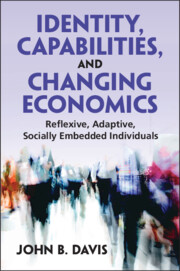Book contents
- Identity, Capabilities, and Changing Economics
- Identity, Capabilities, and Changing Economics
- Copyright page
- Dedication
- Contents
- Tables
- Boxes
- Preface
- Acknowledgments
- Part I The Failed Pathway and Exit Strategies
- Part II Building a Socially Embedded Individual Conception
- 4 Adaptive Reflexive Individuals
- 5 A General Theory of Social Economic Stratification
- 6 Roads Not Taken Yet to Be Taken
- Part III Value and Subjectivity
- References
- Index
6 - Roads Not Taken Yet to Be Taken
Enhanced Capabilities
from Part II - Building a Socially Embedded Individual Conception
Published online by Cambridge University Press: 11 January 2024
- Identity, Capabilities, and Changing Economics
- Identity, Capabilities, and Changing Economics
- Copyright page
- Dedication
- Contents
- Tables
- Boxes
- Preface
- Acknowledgments
- Part I The Failed Pathway and Exit Strategies
- Part II Building a Socially Embedded Individual Conception
- 4 Adaptive Reflexive Individuals
- 5 A General Theory of Social Economic Stratification
- 6 Roads Not Taken Yet to Be Taken
- Part III Value and Subjectivity
- References
- Index
Summary
Chapter 6 moves from combatting capability shortfalls to expanding people’s capability development through capability gains. In addition to promoting people’s basic capabilities for what they can be and do, we can also promote their potential enhanced capabilities when societies are democratic and reduce social inequality. I argue this calls for envisioning the economy as a capability generation process rather than as income generation process (or preference satisfaction process) as the mainstream sees it. I address the relationship between democracy and capabilities, explain democracy in the social contract tradition as a system of public reason, discuss the nature of collective capabilities in terms of the idea of people forming collective intentions, and argue that this all entails seeing democratic societies as “open political systems” that allow for constant innovation and evolution in how diverse kinds of people settle upon and consent to rules that govern the decision-making practices they find functional to living together. Finally, I close by arguing that this is all inconsistent with the mainstream conception of private subjectivity. I return to the idea of a person’s self-narratives as a personal identity capability and suggest understanding it requires we rethink how subjectivity is socially embodied and socially situated – a topic taken up in Part III.
Keywords
- Type
- Chapter
- Information
- Identity, Capabilities, and Changing EconomicsReflexive, Adaptive, Socially Embedded Individuals, pp. 135 - 160Publisher: Cambridge University PressPrint publication year: 2024

